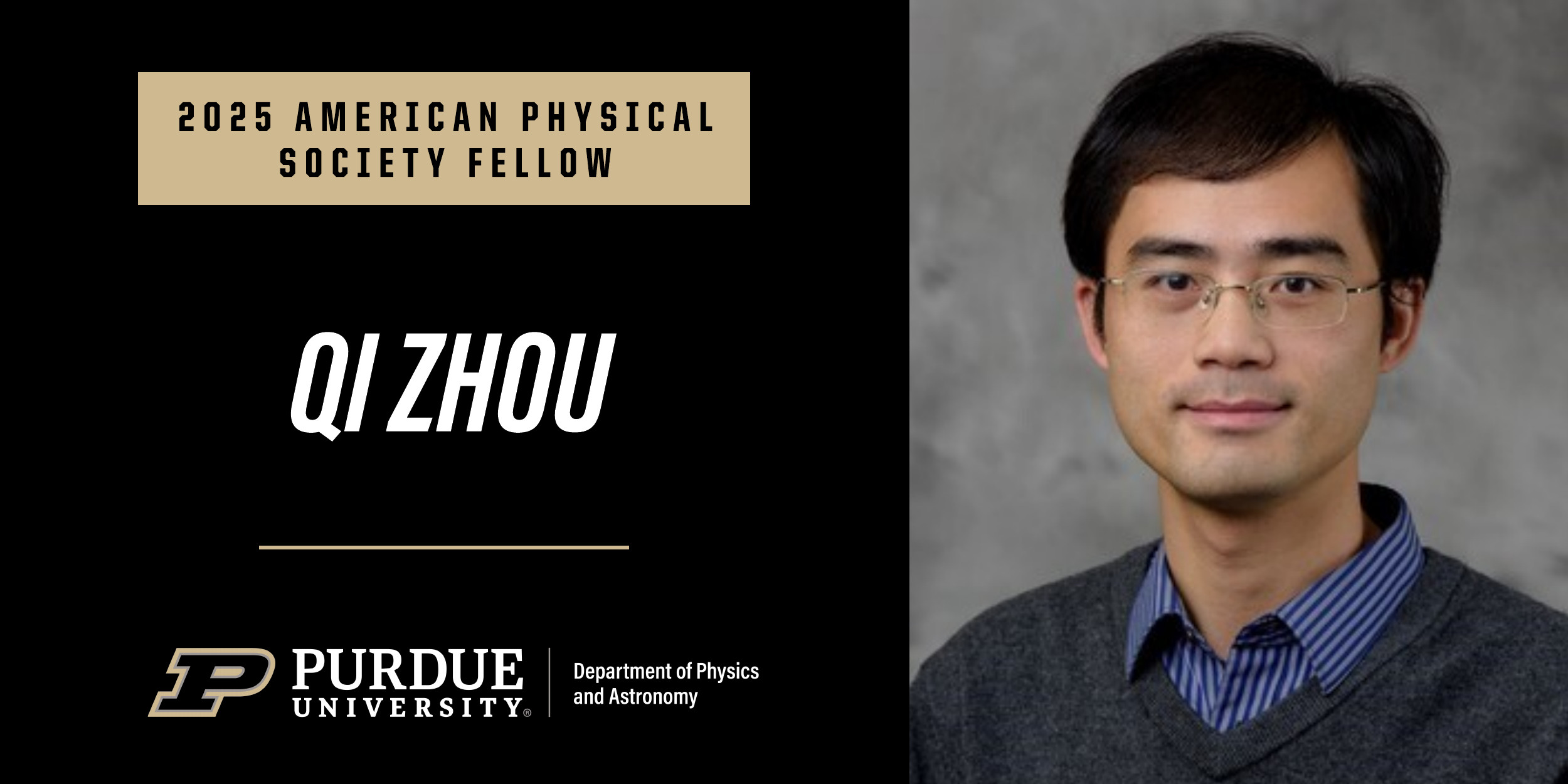Qi Zhou named American Physical Society Fellow
2025-10-17

Qi Zhou, professor in the Physics and Astronomy Department, has been elected as a 2025 American Physical Society (APS) Fellow, a prestigious recognition given to scientists who have made exceptional contributions to physics. He was selected for this honor by the Council of Representatives of the APS's Division of Atomic, Molecular & Optical Physics, "For work on the fundamental issues in quantum simulation, including geometrization of quantum dynamics, equivalence between the physics of non-Hermitian Hamiltonians and that in curved spaces, synthetic gauge fields, and synthetic Hall cylinders." This recognition reflects Purdue's ongoing commitment to excellence in research across a wide range of physics disciplines.
The APS Fellowship Program was created to recognize members who may have made advances in physics through original research and publication, or who have made significant innovative contributions in the application of physics to science and technology.
Zhou is a theoretical physicist specializing in Atomic, Molecular, and Optical Physics, with a research focus at the intersection of condensed matter physics and quantum information science. His recent work centers on quantum simulation, with a twofold aim: first, to address long-standing questions in complex quantum systems using highly controllable platforms such as ultracold atomic gases; and second, to uncover novel physical phenomena and principles that are inaccessible in naturally existing materials.
Recent advances from his group include a geometric framework that unifies diverse forms of quantum dynamics, a duality between non-Hermitian systems in flat spaces and their counterparts in curved spaces, and investigations of synthetic quantum matter engineered through matter-light interactions and geometric design. These results reflect an ongoing effort to deepen the understanding of quantum few- and many-body systems through innovative theoretical approaches.
APS Fellowship is a distinct honor signifying recognition by one's professional peers. Each year, no more than one-half of 1% of the society's membership (excluding student members) are elected as American Physical Society Fellows.
About the Department of Physics and Astronomy at Purdue University
Purdue's Department of Physics and Astronomy has a rich and long history dating back to 1904. Our faculty and students are exploring nature at all length scales, from the subatomic to the macroscopic and everything in between. With an excellent and diverse community of faculty, postdocs and students who are pushing new scientific frontiers, we offer a dynamic learning environment, an inclusive research community and an engaging network of scholars.
Physics and Astronomy is one of the seven departments within the Purdue University College of Science. World-class research is performed in astrophysics, atomic and molecular optics, accelerator mass spectrometry, biophysics, condensed matter physics, quantum information science, and particle and nuclear physics. Our state-of-the-art facilities are in the Physics Building, but our researchers also engage in interdisciplinary work at Discovery Park District at Purdue, particularly the Birck Nanotechnology Center and the Bindley Bioscience Center. We also participate in global research including at the Large Hadron Collider at CERN, many national laboratories (such as Argonne National Laboratory, Brookhaven National Laboratory, Fermilab, Oak Ridge National Laboratory, the Stanford Linear Accelerator, etc.), the James Webb Space Telescope, and several observatories around the world.
About the College of Science
Purdue University's College of Science is committed to the persistent pursuit of the mathematical and scientific knowledge that forms the very foundation of innovation. More than 350 tenure-track faculty conduct world-changing research and deliver a transformative education to more than 6,800 undergraduates and 1,800 graduate students. See how we develop practical solutions to today's toughest challenges with degree programs in the life sciences, physical sciences, computational sciences, and mathematics at www.purdue.edu/science.
Written by: David Siple, communications specialist, Purdue University Department of Physics and Astronomy